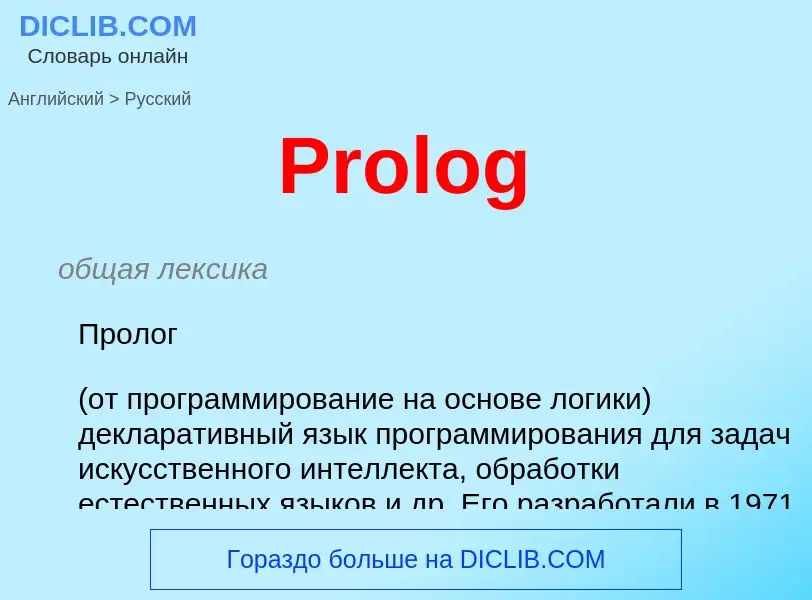Übersetzung und Analyse von Wörtern durch künstliche Intelligenz ChatGPT
Auf dieser Seite erhalten Sie eine detaillierte Analyse eines Wortes oder einer Phrase mithilfe der besten heute verfügbaren Technologie der künstlichen Intelligenz:
- wie das Wort verwendet wird
- Häufigkeit der Nutzung
- es wird häufiger in mündlicher oder schriftlicher Rede verwendet
- Wortübersetzungsoptionen
- Anwendungsbeispiele (mehrere Phrasen mit Übersetzung)
- Etymologie
Prolog - Übersetzung nach Englisch
общая лексика
Пролог
(от программирование на основе логики) декларативный язык программирования для задач искусственного интеллекта, обработки естественных языков и др. Его разработали в 1971 - 1972 гг. Алэн Колмероэ (Alain Colmerauer) и Филипп Рассель (Philippe Roussel) в университете в Лумини (г. Марсель). В дальнейшем Пролог развивали различные коллективы, среди которых следует выделить группу Эдинбургского университета. Название происходит от "программирование в терминах логики" (Programmation en Logique). Первая реализация - Prolog 10 (Дэвид Уоррен и др.) на PDP-10. Отсюда термин - эдинбургский синтаксис, или синтаксис DEC10. В настоящее время имеется обширное семейство языков логического программирования, построенных на базе языка Пролог, Prolog-2, Prolog++, Prolog-Linda, Prolog-III, Turbo Prolog, PDS Prolog и др.
Смотрите также
Definition
Wikipedia
Prolog is a logic programming language associated with artificial intelligence and computational linguistics.
Prolog has its roots in first-order logic, a formal logic, and unlike many other programming languages, Prolog is intended primarily as a declarative programming language: the program logic is expressed in terms of relations, represented as facts and rules. A computation is initiated by running a query over these relations.
The language was developed and implemented in Marseille, France, in 1972 by Alain Colmerauer with Philippe Roussel, based on Robert Kowalski's procedural interpretation of Horn clauses at University of Edinburgh.
Prolog was one of the first logic programming languages and remains the most popular such language today, with several free and commercial implementations available. The language has been used for theorem proving, expert systems, term rewriting, type systems, and automated planning, as well as its original intended field of use, natural language processing. Modern Prolog environments support the creation of graphical user interfaces, as well as administrative and networked applications.
Prolog is well-suited for specific tasks that benefit from rule-based logical queries such as searching databases, voice control systems, and filling templates.

![Artwork by [[Gustave Doré]]. Artwork by [[Gustave Doré]].](https://commons.wikimedia.org/wiki/Special:FilePath/Prologue I.jpg?width=200)
